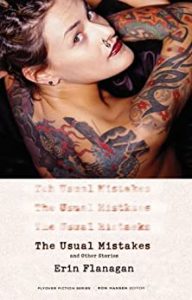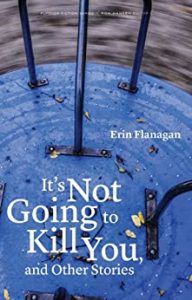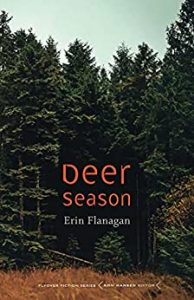An Interview with Erin Flanagan
 Sometimes when I interview friends, I worry that I won’t find the right questions to come up with. Like too much information might spin in my brain to see the person and their book(s) clearly. But then, I get answers back from people like Erin Flanagan, who I am lucky enough to call friend, supporter, writing retreat partner, and more, and I realize just how unique she is and why I was drawn to her in the first place. But this interview isn’t about me. It’s about Erin, and I don’t think words are enough to convey my admiration for her and her work. She’s the author of two short story collections, The Usual Mistakes and It’s Not Going to Kill You, and her debut novel, Deer Season, released in September. Author Jess Montgomery said of the book, “Flanagan takes clear-eyed aim at the foibles and strengths of the human heart, ultimately plumbing its tenderness through characters whose lives in Middle America are deftly rendered through a riveting plot,” and one Amazon reviewer wrote, “With the complex characters and the satisfying and surprising conclusion, Flanagan has written a stunning, extraordinary debut novel.” And Erin won’t stop celebrating there—her next book, a thriller entitled Blackout, is set to release next year with Thomas & Mercer. As with all my interviews, I’m so grateful for Erin’s time and thoughtful answers. My only regret is that I didn’t get a chance to ask about her dogs, Mavis and Lorna, so that readers could hear about those dear creatures. Maybe next time.
Sometimes when I interview friends, I worry that I won’t find the right questions to come up with. Like too much information might spin in my brain to see the person and their book(s) clearly. But then, I get answers back from people like Erin Flanagan, who I am lucky enough to call friend, supporter, writing retreat partner, and more, and I realize just how unique she is and why I was drawn to her in the first place. But this interview isn’t about me. It’s about Erin, and I don’t think words are enough to convey my admiration for her and her work. She’s the author of two short story collections, The Usual Mistakes and It’s Not Going to Kill You, and her debut novel, Deer Season, released in September. Author Jess Montgomery said of the book, “Flanagan takes clear-eyed aim at the foibles and strengths of the human heart, ultimately plumbing its tenderness through characters whose lives in Middle America are deftly rendered through a riveting plot,” and one Amazon reviewer wrote, “With the complex characters and the satisfying and surprising conclusion, Flanagan has written a stunning, extraordinary debut novel.” And Erin won’t stop celebrating there—her next book, a thriller entitled Blackout, is set to release next year with Thomas & Mercer. As with all my interviews, I’m so grateful for Erin’s time and thoughtful answers. My only regret is that I didn’t get a chance to ask about her dogs, Mavis and Lorna, so that readers could hear about those dear creatures. Maybe next time.
Christina: Congrats on the publication of your first novel. You previously published short story collections, so what about Deer Season made it a novel and not a work of short fiction?
Erin: I knew from the get-go that I was working on a novel. I could tell by the scope and heft. I don’t think I’ve ever confused one for the other, although I’ve certainly had ideas for both stories and novels that didn’t pan out. I felt very lucky the seed for this novel kept growing and digging deeper, which by the way, is probably the first time I’ve used a gardening metaphor. Complete black thumb.
Christina: Does your writing process differ for short stories versus novels? Do you feel one has advantages over the other?
Erin: The process definitely differs, and I wonder sometimes if starting in short stories didn’t do me a disservice as a novelist. A story is something you can hold in your hands, and even sometimes write a draft of in a day. So when I’d write or revise a story, I could always go back to the beginning and try to get a sense what I was dealing with. I couldn’t start at the beginning every day with a novel, and at some point I just had to keep plodding forward. I also had a hard time holding a full novel in my head, remembering what I had cut or added draft to draft, so logistically it was just a much harder thing to adjust to. For me, writing novels lack a lot of the spontaneity and excitement that writing short stories has. I think of stories as passionate one-night stands while novels are marriages, and both contain the pros and cons you’d expect within those scenarios.
Christina: The Midwest serves as the backdrop of most (all?) of your stories. What about the Midwest calls to you? Do you feel the Midwest has something to offer that other places do not?
Erin: I’ve lived almost exclusively in the Midwest, but in many different areas of it: Iowa, Illinois, Nebraska, South Dakota, Minnesota, and now Ohio. The thing that constantly frustrates me in the portrayal of Midwesterners is how they’re drawn as simpletons. I think stoic gets misinterpreted as simple, and nice gets misinterpreted as fake or stupid, but there’s a super power to being constantly underestimated. It’s funny because readers outside the Midwest have said they appreciated my character depth, while Midwesterners have been like, thank Christ. They say they were nervous to read Deer Season and see another pandering portrayal and have thanked me for showing us as complex.
Christina: Alma Costagan is a memorable character, and her sense of humor had me laughing at times, despite the heavy nature of the book. How do you go about crafting characters? Did anything surprise you about Alma as she unfolded?
Erin: Probably the thing that irritates me the most about portrayals of Midwesterners is that people act like we don’t have senses of humor, when in fact we’re the funniest people in America, without that cloying, coastal earnestness to muck it up.
Alma was one of my favorite characters to write because she constantly said things that surprised me, and yet the thing that probably surprised me the most was her vulnerability. It wasn’t until many drafts in that she really started to open up and I figured out how soft she really was, how eager to keep herself safe. Like those in the town where she lives, I only saw the gruff exterior, and it felt like a gift when I got to know more.
Christina: As much as I love Alma, Milo Ahern, Peggy’s brother, is a scene stealer. He’s inquisitive, loving, stubborn, perceptive, and hopeful that Peggy will come home. Who inspired Milo? Have you thought about what happens to Milo after the story is over? Who does he become?
Erin: I love this question! It’s one no one else has asked and yet I’ve been dying to answer what happened to him. I think nothing but good things come for Milo in the long run, yet the absence of his sister will haunt him. He will get out of Gunthrum, Nebraska, and live in a big city, and much to his surprise, he’ll miss it. He’ll continue to see his parents as complicated and flawed, but even find a way to love his father. He’ll become an activist and professor who’s very popular with students. He’ll find a partner who is fiercely loyal and an extrovert, and they’ll marry in 2015 after almost fifteen years together.
As for who inspired him, he’s partly based on me as a kid growing up in a similar town, and partly based on my husband who was never good at sports and was a budding intellectual, and who got bullied as a boy as a result. But he was also a tough little shit and knew to beat up the biggest kid on the playground to get everyone to leave him alone, so he put those smarts to work.
Christina: Your first book of short fiction came out in 2005. How have aspects of publishing changed over the last sixteen years? Do you think those changes are for the better? How have you changed or adapted as a writer?
Erin: I think in the last sixteen years, the market has becomes incredibly competitive in a way it wasn’t before, from acceptances into writing programs, literary journals, retreats, conferences, and book publishing. I think in some ways, this is a great thing: I think it represents that a lot more voices are vying for these slots rather than just the whitewash that ran these institutions for so long. I think a downside is that it takes more and more to get a foot in the door and that can be discouraging for a passion that’s already built on so much rejection. For instance, I think people entering writing programs have the credentials I did when I graduated with a PhD. I wouldn’t get in now, and that’s fine, but I also don’t know that I would have kept writing without that boost, both emotionally and intellectually. I hope so, and I think so, but I’ve also felt like one more rejection might break me of what most certainly must be a terrible habit.
Christina: What does literary success mean to you?
Erin: I honestly feel like I need to answer this twice: both honestly, and with what I wish the answer was. I’ll say in my defense that what I wish the answer was isn’t to impress someone else or make me seem deeper than I am but what I think would bring me the most happiness and contentment.
I wish literary success was only about the work. I wish it was about the joy of problem solving and creating and figuring out things through writing. I wish that was enough, because when it gets down to it, it really is what I think matters the most. It’s like how I know who I am as a person matters more than the size of my ass, but, as I’m pulling my jeans on in the morning, it’s hard to convince me of that no matter how many body-positivity posts I like on Insta.
And the real answer to the question “what is literary success?” is this: It’s the next thing that’s just out of reach. The next book contract, or the next positive review, or the next award. And the problem with this is that, once it’s achieved, it’s automatically disqualified as the definition of success because the definition is the next thing. It’s the hedonic treadmill specifically for writers.
It’s like how year after year I search for the perfect planner, but nothing has exactly all the features I want. Too many columns, not enough note-taking pages, a stupid font. Part of me wonders, if I do find the perfect planner would even that satisfy me, or would I be left bereft, all of my desires suddenly met?
But if someone wants to give me a big award and the perfect planner, I’m willing to risk it.
Erin can be found in multiple places!
Website: https://erinflanagan.net/
Twitter: @ErinLFlanagan
Thanks to Erin for agreeing to this interview! If you know of an author who’d like to be featured in an interview (or you are an author who would like to be featured), feel free to leave a comment or email me via my contact page.



